Meyer Burger Bundle
Who Buys Meyer Burger Solar Panels?
In the ever-evolving world of renewable energy, understanding the Meyer Burger SWOT Analysis is crucial. Identifying the ideal customer for Meyer Burger is key to navigating the complexities of the solar panel market analysis. This exploration dives deep into the customer demographics Meyer Burger targets, providing a comprehensive view of their customer profile.
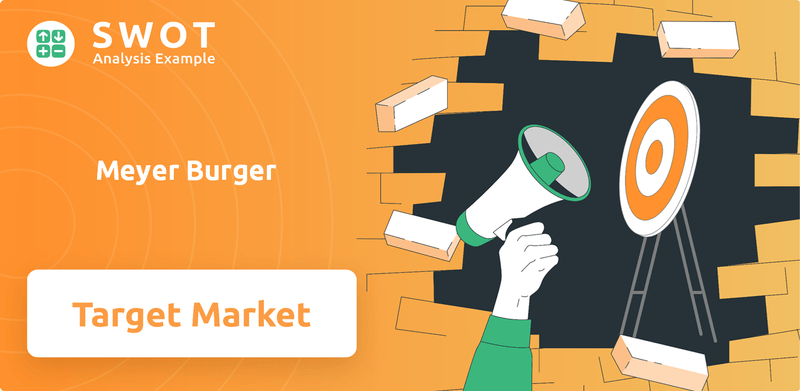
Meyer Burger's strategic shift from equipment provider to solar panel manufacturer has reshaped its target market. This transition necessitates a thorough examination of the company's customer segmentation strategy and customer acquisition methods. Analyzing the renewable energy consumers and their preferences is essential for Meyer Burger to maintain and grow its market share, especially in a competitive landscape. Understanding the Meyer Burger target market geographic location and customer buying behavior is key for success.
Who Are Meyer Burger’s Main Customers?
Understanding the customer demographics of Meyer Burger involves recognizing its primary focus on the business-to-business (B2B) solar energy sector. The company's target market centers on large-scale solar projects and developers, particularly within the United States. While detailed demographic breakdowns of individual clients aren't publicly available, the customer profile primarily includes major utility companies and solar project developers.
The Marketing Strategy of Meyer Burger has evolved, shifting from supplying equipment to solar manufacturers to becoming a direct manufacturer of solar modules. This strategic pivot is largely driven by favorable policies in the U.S., such as the Inflation Reduction Act (IRA), and the competitive landscape in Europe. This transition highlights the company's adaptability and its commitment to capitalizing on growth opportunities within the U.S. market.
This strategic shift is significant, with Meyer Burger anticipating substantial financial gains. The company projects annual sales of CHF 350 million to CHF 400 million and an EBITDA of around CHF 70 million from its U.S. operations by 2026. This growth underscores the importance of the U.S. market and the company's strategic focus on key customer segments within the renewable energy sector.
Meyer Burger's target market predominantly comprises large utility companies involved in solar energy projects. These companies invest in significant solar installations. The company also focuses on solar project developers, who are crucial for constructing and managing large-scale solar farms.
The company is expanding its reach to include commercial and industrial entities. These entities are increasingly investing in solar installations to reduce costs and improve sustainability. This expansion reflects a broader market trend towards decentralized solar energy solutions.
Meyer Burger has formed strategic partnerships to secure its position in the market. For instance, the company signed an agreement with D.E. Shaw Renewable Investments (DESRI) to supply up to 5 GW of modules for large-scale U.S. solar projects between 2024 and 2029. This partnership highlights the company's ability to secure large-scale contracts.
The primary geographic focus is the United States, driven by favorable policies and market opportunities. This strategic concentration allows Meyer Burger to optimize its resources and capitalize on the growing demand for solar energy in the U.S. market.
Meyer Burger's ideal customer profile includes large-scale solar project developers and utility companies. These customers are characterized by their significant investment capacity and commitment to renewable energy. They are looking for high-quality solar modules to support their projects.
- Large utility companies
- Solar project developers
- Commercial and industrial entities
- Entities investing in large-scale solar installations
Meyer Burger SWOT Analysis
- Complete SWOT Breakdown
- Fully Customizable
- Editable in Excel & Word
- Professional Formatting
- Investor-Ready Format
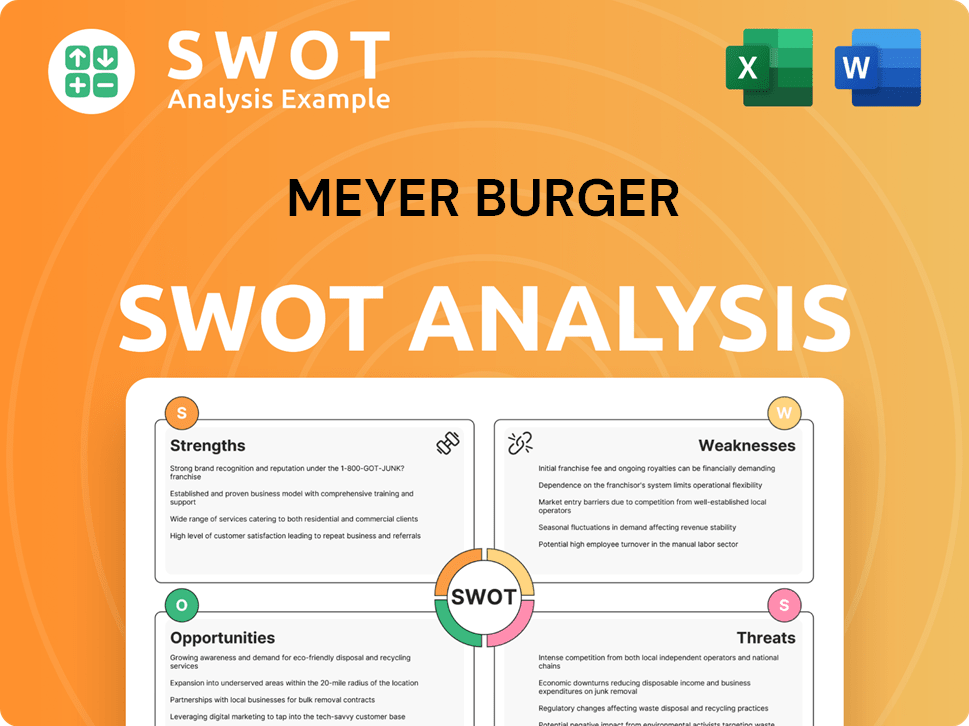
What Do Meyer Burger’s Customers Want?
Understanding the customer needs and preferences is crucial for the success of any business, and for the solar industry, this is especially true. For Meyer Burger, a key player in the solar panel market, the focus is on delivering high-performance, reliable, and durable solar solutions. This customer-centric approach allows the company to meet the demands of its primary B2B customers in the renewable energy sector.
The target market for Meyer Burger includes businesses and organizations that require superior energy yield and long-term performance from their solar investments. These customers prioritize efficiency, durability, and the total cost of ownership when making purchasing decisions. Meyer Burger's innovative technologies, such as heterojunction (HJT) and SmartWire Connection Technology (SWCT), are designed to meet these specific needs. The company's focus on lead-free and PFAS-free modules also aligns with the growing environmental concerns of its customers.
The customer profile for Meyer Burger is characterized by a demand for high-quality, sustainable solar solutions. The company's commitment to continuous product improvement and customer satisfaction is evident in its design choices and technological advancements. By understanding and addressing the needs of its customers, Meyer Burger aims to maintain its position in the competitive solar panel market.
Meyer Burger's customers prioritize solar solutions that offer superior energy yield and long-term performance. The company's modules are designed to provide high efficiency and durability, addressing these key customer needs. The SmartWire technology enhances longevity and reliability by eliminating soldering failures.
Customers increasingly seek environmentally friendly products. Meyer Burger addresses this by producing lead-free and PFAS-free modules. This commitment aligns with the growing environmental consciousness within the renewable energy consumers market.
The total cost of ownership is a critical factor for customers. Meyer Burger's focus on low degradation rates and high warranties is crucial for long-term investment security. These features help reduce the overall costs associated with solar projects.
Meyer Burger tailors its products to meet specific segment needs. For residential applications, the company offers sleek black designs. Bifacial options are available for enhanced energy generation, catering to diverse customer requirements.
Maintaining technological capabilities in Germany for future development demonstrates a commitment to continuous product improvement. This ensures that Meyer Burger can adapt to changing market demands and customer preferences. This commitment also enhances the company's market share.
Feedback from customers, such as those in Arizona, highlights the excellent performance of Meyer Burger panels in high-heat conditions. This feedback helps the company refine its products and better serve its target market.
Meyer Burger's customer base values high-performance, reliable, and durable solar solutions. Understanding these preferences is crucial for the company's success in the solar panel market. The company's products are designed to meet these specific demands.
- Efficiency: Customers prioritize solar panels with high energy conversion efficiency.
- Durability: Long-lasting panels that can withstand various environmental conditions are highly valued.
- Reliability: Consistent performance and minimal degradation over time are essential.
- Sustainability: Demand for lead-free and PFAS-free modules is increasing.
- Warranty: Customers seek products with robust warranties for long-term investment security.
Meyer Burger PESTLE Analysis
- Covers All 6 PESTLE Categories
- No Research Needed – Save Hours of Work
- Built by Experts, Trusted by Consultants
- Instant Download, Ready to Use
- 100% Editable, Fully Customizable
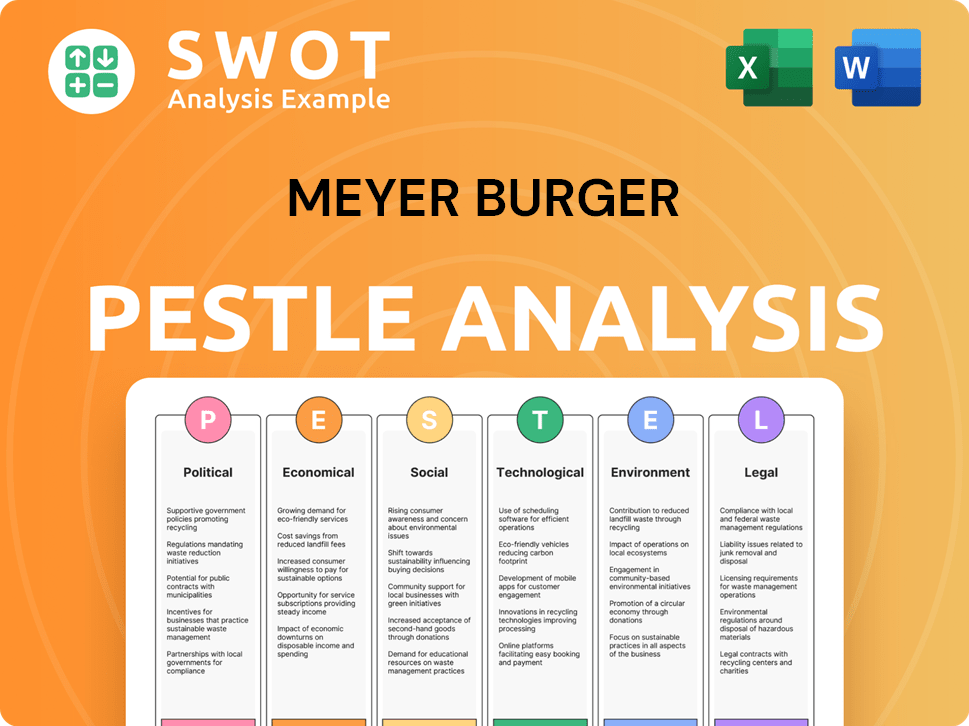
Where does Meyer Burger operate?
The geographic focus of Meyer Burger has shifted dramatically. Formerly with a strong presence in Europe, the company is now concentrating its efforts in the United States. This strategic pivot is driven by favorable policies and market opportunities.
While maintaining a research center and an equipment site in Germany, and continuing cell production there to support U.S. operations, the company has ceased module production in Germany. The United States has become Meyer Burger's primary market, where it is establishing significant manufacturing capacity.
The company's move to the U.S. is largely influenced by the Inflation Reduction Act (IRA), which incentivizes domestic manufacturing. This localization strategy aims to provide a secure supply chain for U.S. projects, reflecting a keen understanding of the Brief History of Meyer Burger and its evolving market strategies.
Meyer Burger began solar module assembly production at its Goodyear, Arizona, plant in June 2024. This plant has an initial annual production capacity of 1.5 GW, with potential to expand to 2 GW. The company is focusing on expanding its manufacturing footprint in the U.S.
A planned solar cell manufacturing plant in Colorado Springs, Colorado, with a 2 GW annual capacity, was canceled due to a lack of third-party financing. Despite this, the company's German cell plant will continue to supply cells to the U.S. module fab.
The strategic shift to the U.S. is driven by the favorable policies of the IRA. This localization strategy aims to provide a secure and transparent supply chain for U.S. projects. This move reflects a deep understanding of the solar panel market analysis and the needs of renewable energy consumers.
Meyer Burger anticipates substantial EBITDA of nearly CHF 250 million annually from its U.S. operations. This highlights the importance of this geographic market for its future profitability and growth. This financial outlook is crucial for understanding Meyer Burger's market share.
While the U.S. is the primary focus, Meyer Burger still maintains a research center and an equipment site in Hohenstein-Ernstthal, Germany. Cell production in Thalheim, Germany, continues to support the U.S. module assembly operations. This ensures a steady supply of components for the U.S. market.
The company's focus on the U.S. market indicates a target market that aligns with the growing demand for renewable energy in the region. Understanding the Meyer Burger target market and the characteristics of who buys Meyer Burger solar panels is crucial for strategic planning.
The localization strategy ensures a secure and transparent supply chain, which is a key factor in attracting customers in the U.S. market. This approach is vital for maintaining a competitive edge and meeting the needs of the Meyer Burger customer profile.
With the U.S. market as its primary focus, Meyer Burger is positioning itself for significant growth. The company's strategic decisions are aimed at capitalizing on the opportunities presented by the renewable energy sector. These strategies are essential for long-term success.
Meyer Burger Business Model Canvas
- Complete 9-Block Business Model Canvas
- Effortlessly Communicate Your Business Strategy
- Investor-Ready BMC Format
- 100% Editable and Customizable
- Clear and Structured Layout
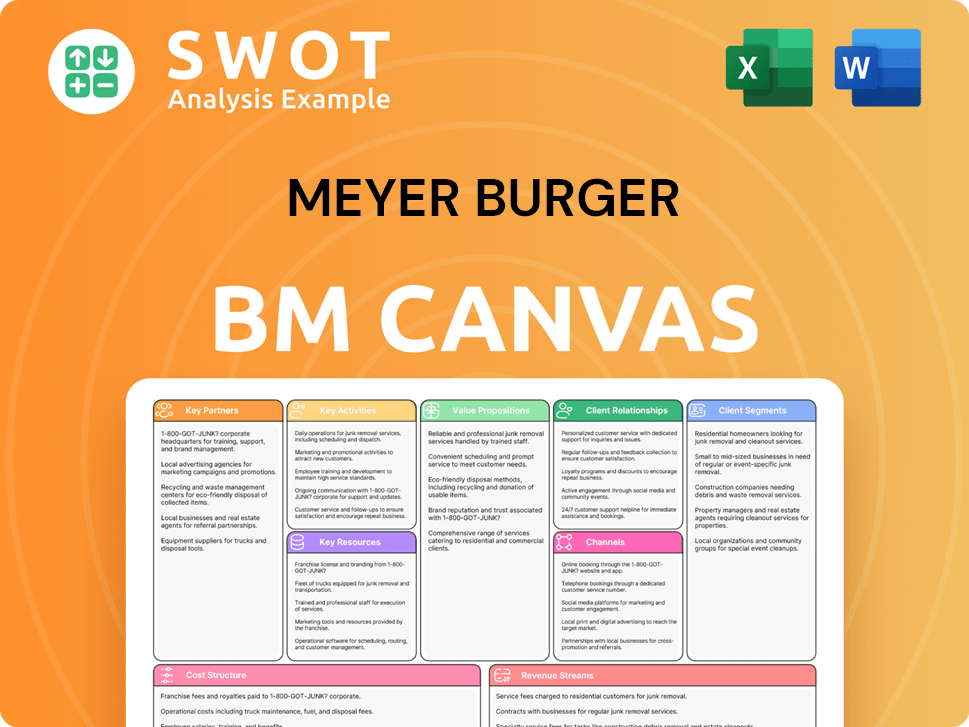
How Does Meyer Burger Win & Keep Customers?
Customer acquisition and retention for the company, which is deeply entrenched in the B2B sector, hinges on long-term partnerships and its advanced technology. A key acquisition strategy involves securing significant off-take agreements with major developers. These agreements not only secure substantial sales volumes but also provide financial stability through 'substantial annual down payments' to procure and finance materials.
The company focuses on the superior performance and durability of its heterojunction (HJT) and SmartWire Connection Technology (SWCT) modules to attract and retain customers. These modules offer higher energy yields and lower degradation rates. The company also emphasizes its commitment to producing lead-free and PFAS-free products, appealing to customers with increasing environmental concerns.
The company's strategic shift to U.S. manufacturing, supported by policies like the Inflation Reduction Act, is a significant part of its acquisition strategy. This move aims to capitalize on incentives for domestic production. The company's ongoing restructuring and efforts to secure additional financing are also critical for long-term customer confidence and retention.
Securing significant off-take agreements with major developers is a primary acquisition method. These agreements, such as the up-to-5 GW module supply deal with D.E. Shaw Renewable Investments (DESRI) between 2024 and 2029, provide substantial sales volume and financial stability. These deals involve 'substantial annual down payments', which help in procuring and financing materials.
The company highlights the superior performance of its heterojunction (HJT) and SmartWire Connection Technology (SWCT) modules. These modules offer higher energy yields and lower degradation rates, which is a key selling point. The focus on lead-free and PFAS-free products also appeals to environmentally conscious customers.
While specific details on digital marketing or CRM systems are not extensively disclosed, the company focuses on direct sales, technical expertise, and strong customer support. Reviews from installers commend the responsive representatives and robust product support, which are crucial for B2B relationships. This customer-centric approach helps in building and maintaining strong relationships.
The company's strategic shift to U.S. manufacturing, supported by policies like the Inflation Reduction Act, is a significant part of its acquisition strategy. This move aims to capitalize on incentives for domestic production. The company's ongoing restructuring and efforts to secure additional financing are also critical for long-term customer confidence and retention. To learn more about the company's financial standing, you can read about the Owners & Shareholders of Meyer Burger.
Meyer Burger Porter's Five Forces Analysis
- Covers All 5 Competitive Forces in Detail
- Structured for Consultants, Students, and Founders
- 100% Editable in Microsoft Word & Excel
- Instant Digital Download – Use Immediately
- Compatible with Mac & PC – Fully Unlocked
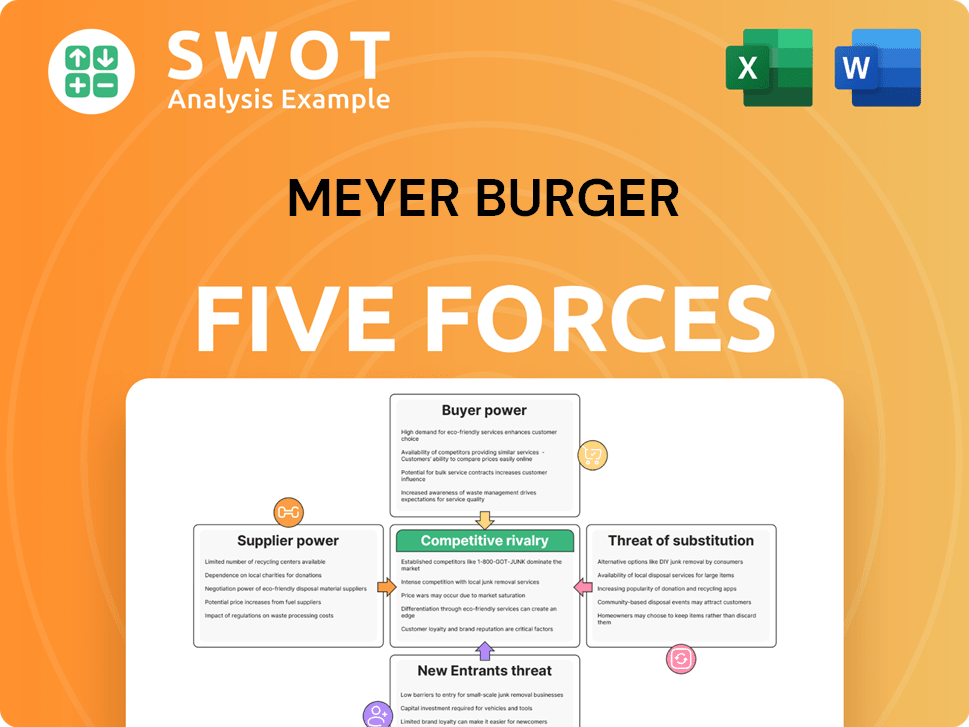
Related Blogs
- What are Mission Vision & Core Values of Meyer Burger Company?
- What is Competitive Landscape of Meyer Burger Company?
- What is Growth Strategy and Future Prospects of Meyer Burger Company?
- How Does Meyer Burger Company Work?
- What is Sales and Marketing Strategy of Meyer Burger Company?
- What is Brief History of Meyer Burger Company?
- Who Owns Meyer Burger Company?
Disclaimer
All information, articles, and product details provided on this website are for general informational and educational purposes only. We do not claim any ownership over, nor do we intend to infringe upon, any trademarks, copyrights, logos, brand names, or other intellectual property mentioned or depicted on this site. Such intellectual property remains the property of its respective owners, and any references here are made solely for identification or informational purposes, without implying any affiliation, endorsement, or partnership.
We make no representations or warranties, express or implied, regarding the accuracy, completeness, or suitability of any content or products presented. Nothing on this website should be construed as legal, tax, investment, financial, medical, or other professional advice. In addition, no part of this site—including articles or product references—constitutes a solicitation, recommendation, endorsement, advertisement, or offer to buy or sell any securities, franchises, or other financial instruments, particularly in jurisdictions where such activity would be unlawful.
All content is of a general nature and may not address the specific circumstances of any individual or entity. It is not a substitute for professional advice or services. Any actions you take based on the information provided here are strictly at your own risk. You accept full responsibility for any decisions or outcomes arising from your use of this website and agree to release us from any liability in connection with your use of, or reliance upon, the content or products found herein.